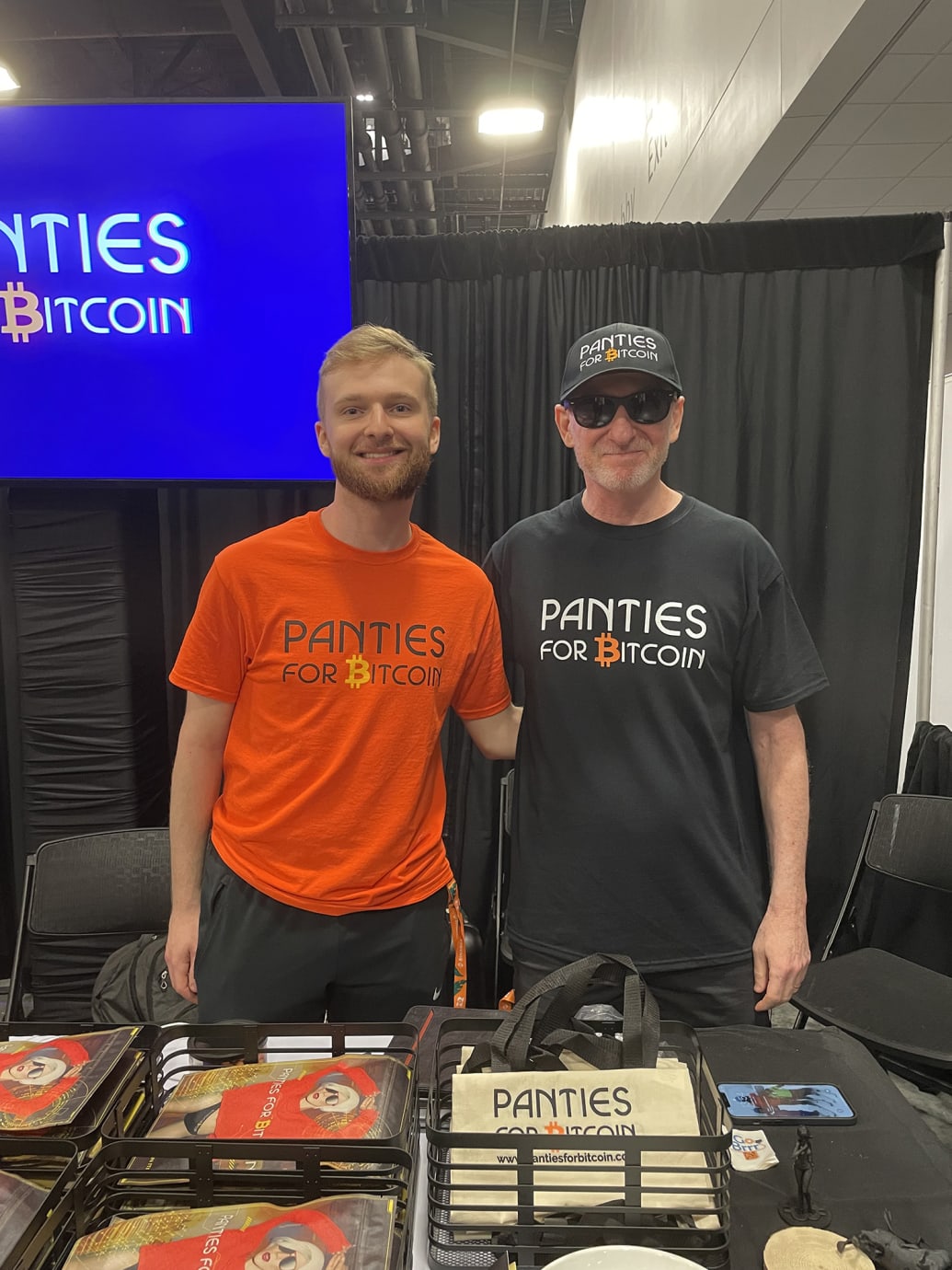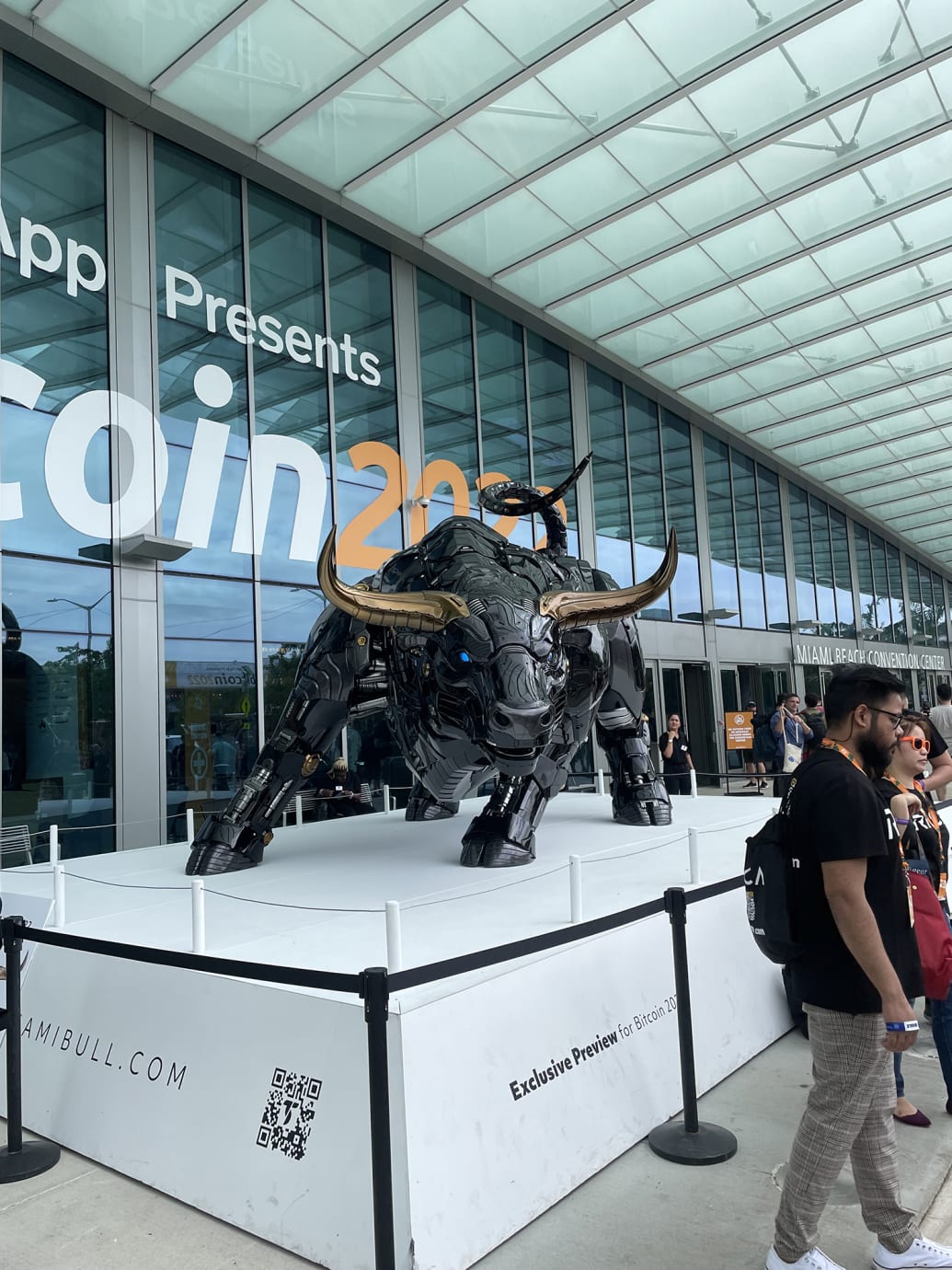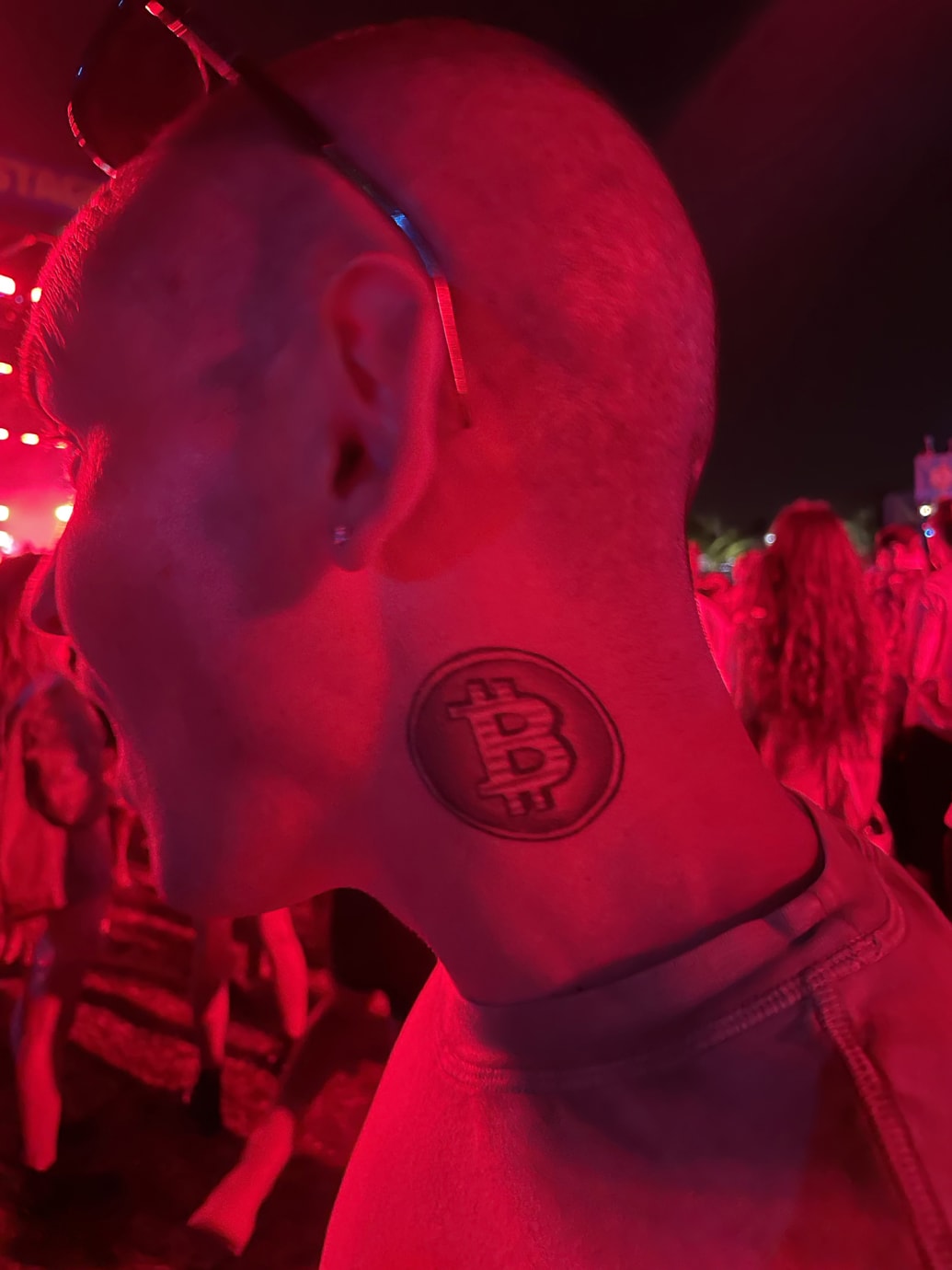MIAMI BEACH—The thing about Bitcoin, the man at the back of the convention center wanted me to know, was that once you understood it, it changed everything. It seeped into every aspect of your life: personal, political, financial. Bitcoin was freedom, he said; it had the power to literally end all war. And that’s why he was here, at Bitcoin 2022—the largest Bitcoin event in the world—trying to spread the gospel through women’s panties.
“Once you get into Bitcoin, there is no way back,” the man, whose name was Pablo, said over piles of women’s underwear emblazoned with the cryptocurrency’s logo. A sign behind him read: “Panties for Bitcoin.”
“Once you understand it, it gets into your life from every point of view—not only the economic point of view,” he continued. ”Once you have control of your money… you have control of everything.”
I heard a similar refrain from other attendees over the course of the conference, including a man who quit his job as an industrial engineer to make Bitcoin-themed merchandise on his 3D printer and a 23-year-old Lebanese jewelry heir who was trying to convince his family to invest their fortune in Bitcoin.
The former engineer asked me why I was among the 25,000 people at the conference, and I told him my reporting beat included cults..
“We’re a cult, absolutely,” he said. “One hundred percent. I love the Bitcoin cult.”

Emily Shugerman/The Daily Beast
If you were looking to join the cult of crypto, Bitcoin 2022 was the place to do it. The conference was a four-day extravaganza dedicated to the world’s oldest and most expensive cryptocurrency, and it promised to be a “pilgrimage for those seeking greater freedom and individual sovereignty.” Speakers ranged from Jordan Peterson, the controversial psychologist and anti-political-correctness firebrand, to NFL quarterback and anti-vaxxer Aaron Rodgers. The attendees were a mix of Bitcoin die-hards, casual investors, and finance and tech bros looking to profit off the latest trend.
The 2022 conference was more than twice the size of last year’s and the organizers rented out the 1.4 million-square-foot convention center in the heart of Miami Beach. A massive logo made of Legos greeted visitors, and bright orange sign boards pointed to destinations like the “Enterprise Stage” and the “Bitcoin Bazaar.” The talks didn’t always succeed in filling up the sprawling ballrooms, but the lines for the coffee stands and pop-up bars were consistently packed.
To entertain guests between panels, there was a massive “Declaration of Monetary Independence” to sign, a video station that would make your eyes look like lasers, and the Miami Bull—an 11-foot, 3,000-pound metal statue styled to look like its Wall Street counterpart, which Miami Mayor Francis Suarez declared would usher in “the future of finance.” The resulting effect was something like a blockchain Disneyland.
A man I met on the first night of the conference said he was there because he “followed the energy”—starting with electronic dance music in the mid-aughts, then podcasts, and now crypto. It sounded insane, but he also had a point. There was an undeniable energy at the conference: a hum of excitement, a feeling that everyone was on the precipice of something big. People telegraphed this fever through Bitcoin-themed jewelry and message T-shirts with slogans like “Inflation is Coming,” “There Will Be Bitcoin,” “Friends don’t let friends sell Bitcoin.” There was at least one person with a Bitcoin tattoo.

Emily Shugerman/The Daily Beast
At the center of the conference was a massive expo hall, where retailers hawked everything from cryptocurrency 401ks to Pepe the Frog T-shirts. Cash App, the mobile payment service founded by Twitter’s Jack Dorsey, erected a massive volcano at the entrance that emitted regular blasts of steam; the crypto exchange Bullish set up a functioning mechanical bull.
At a stand selling Bitcoin-themed children’s books and promoting “Bitcoin education for all ages,” a couple stopped to buy a “HODL Me Tight” onesie for their baby, who they had brought to the conference. Across the hall, a woman with overlined lips and bleach blonde hair was selling a concept called “CommuniSea,” in which members purchase shares in a luxury megayacht with on-board chefs and private trainers. Each “share” gave members a certain number of points, which translated to a certain number of nights on the yacht—all for the low starting price of $395,000 a year.
“So it’s like a timeshare,” I said to the woman.
“No, no, no,” she assured me. “It’s like an NFT.”
At the yacht booth, a 29-year-old named Matt Perejda, excited to talk to a reporter, launched into a pitch for his mobile phone startup. His idea was to put hardware in the phone that would connect users to the entire Bitcoin network—like Venmo, but for the whole world. Lowering his voice, he admitted he tried his hand at some other cryptocurrencies, adding that “they” didn’t like it when you discussed other currencies here. Those currencies had potential for making a lot of money, he said, but they weren’t like Bitcoin: “They aren’t going to change the world.”
The biggest challenge to the Bitcoin-as-cult theory was that the community does not have a central, charismatic leader. The only person who comes close is Satoshi Nakamoto, the mysterious creator of Bitcoin, whose real name is still unknown and who hasn’t been heard from since 2010. (The main convention center stage was renamed the “Nakamoto Stage” for the event, and various quotes from his famous white paper were projected onto pillars flanking it.)
But there are definitely Bitcoin celebrities—-the people everyone in the community knows and follows with the ferocity of a sorority girl keeping up with The Bachelor. Perhaps the purest example of this is Jack Mallers, the 27-year-old CEO of digital payment processor Strike, who is revered in the community for helping El Salvador adopt Bitcoin as its official currency. The house was packed when he gave his Thursday afternoon speech, relentlessly pacing the stage with the energy of a teenage SoundCloud rapper. After giving an extended history of the American credit card system, Mallers finally made the announcement that the crowd was anticipating: Strike, and therefore Bitcoin, would be accepted at thousands of retail stores across the country. The audience went wild.
“This is about America,” he said to cheers. “We need to protect our ability to innovate.”
“Nobody loses, everyone is invited, it’s a fair game,” he added later. And then: “This is our announcement. It’s not my announcement. We did this.”
By the end of the speech, the crowd was on their feet, clapping and cheering. The man beside me looked like he was about to cry. Several people left the event fist-pumping. It was easy to forget that what Mallers was talking about was a way to pay for groceries.

Tim Warren and Christian Maynard, co-hosts of the YouTube show “Coffee and Crypto”
Emily Shugerman/The Daily Beast
Near the bar at a break between panels, I met three middle-aged men from Tampa, Los Angeles, and somewhere in Wisconsin, who had become friends in a chat room dedicated to a crypto YouTuber and decided that Bitcoin 2022 would be the perfect place to meet in person. They had the freewheeling energy of a bachelor party—”He has a restraining order that says he can’t be this close to pretty ladies,” one of them joked when he saw his friend talking to me—but their excitement was infectious.
“Bitcoin is the most giving community I have ever experienced,” one of them, Matt, said, explaining how everyone he met had been so generous with their time and advice. And it made sense, he added: “What’s good for everyone is also good for Bitcoin.”
Later in the conference, I met up with two co-hosts of the YouTube show “Coffee and Crypto,” Tim Warren and Christian Maynard. They said they knew nothing about crypto until they started working with the main host, Jebb McAfee, a little over a year ago. Warren, who previously worked as a minister and personal trainer, and Maynard, who was a line cook at Chick-fil-A, said investing in cryptocurrency had turned around not only their finances, but their outlook on life.
“Jesus was the hope for mankind,” Warren said of the link between his faith and his infatuation with crypto.
“We now live in a world where the U.S. dollar is failing, the euro is failing, the yuan is failing, we’re dying. And then boom—Bitcoin!” he continued. “There’s hope now.”
The religious overtones carried over into a happy hour at a nearby hotel, where I met two men who had helped put on an outside event for Christian Bitcoiners called Thank God for Bitcoin. The men, Ahshuwah Hawthorne and David Cotrone, recognized my name instantly; I had written in earlier to ask for tickets to the event—a gathering of Christian Bitcoiners—and been rejected. (Something about mainstream media and bias against Bitcoin, they explained.) But they gamely offered to answer my questions.
Hawthorne, a former pastor and executive director of a Christian nonprofit, said he thought of Bitcoin as a primer for religion: both required evangelizing, conversion, and community building. Also, both required acceptance of a higher power you cannot control: just like you can’t rewrite the Bible, you can’t change the rules of Bitcoin. But the problem, he added, is that with God, there was always a chance for salvation. With Bitcoin, there was no such thing. The market could crash, you could lose the passcode to your digital crypto wallet—a striking number of people have done this, leaving millions of dollars out of reach on the blockchain—or you could get hacked. Bitcoin, he concluded, is “all truth, no grace.”

Emily Shugerman/The Daily Beast
If the adherents to the Bitcoin gospel have shared core beliefs, they also have common enemies: old-guard billionaires Bill Gates and Warren Buffett, for criticizing Bitcoin; Elizabeth Warren for her insistence on regulation; and Canadian Prime Minister Justin Trudeau, a newer target for his crackdown on the anti-vaxx trucker protests.
Perhaps no one put as fine a point on this as Peter Thiel, the billionaire entrepreneur and Trump supporter. At his keynote Thursday, Thiel presented a PowerPoint of the men he deemed “enemies” of Bitcoin: Buffet, JPMorgan CEO Jamie Dimon, and BlackRock CEO Larry Fink—all of whom have dismissed it as a passing fad.
“This is what we have to fight for Bitcoin to go 10x,” Thiel declared, then called Buffet a “sociopathic grandpa.” The crowd, which has been silent for most of the speech, noticeably perked up.
“He’s asking for an insurrection against the anti-Bitcoiners!” the man behind me said excitedly, to no one in particular.
Many of the Bitcoin die-hards truly believe that not only are these historic power-players poised to fall, but that the entire economic system is teetering on the brink of failure—whether because of inflation, corruption, or the coming Bitcoin revolution. One of the booths at the expo hall was selling citizenships to other countries for those who want to prepare by getting two passports. At his panel, podcaster Adam Curry warned audience members that “Bitcoin and your community” were “the only way you will get out of the coming collapse.” (This, he explained, was the reasoning behind his new venture connecting cattle ranchers with consumers to sell beef in Bitcoin.)
There are also straight-up Bitcoin conspiracy theories, among them that Satoshi is dead and that Bitcoin was created by the CIA. The last one was repeated to me by a middle-aged woman from Connecticut named Danielle, whom I met at an event for women in crypto. She told me used to manage a bank branch; now she worked as a restaurant server. Decades ago, she’d given money to a professional investor for retirement, but didn’t see much growth. So now, she was all in on crypto: She’d bought 30 different kinds of tokens and 24 NFTs—non-fungible tokens, or digital assets—the equivalent of her entire retirement savings.
When I told Danielle I report on cults, she was immediately defensive. Study some basic economics, look at inflation numbers, then tell me we’re a cult, she said. But she was cagey about whether she’d made any money on her crypto investments yet. The market had been volatile, she said, but she still hadn’t lost her original investment.
“Anyway, I’m really hoping we’re right,” she told me. “Because something’s gotta pay off. I can’t keep working like this forever.”
The conference ended Saturday with the “Sound Money Fest”—a daylong event billed as the world’s first Bitcoin music festival. I arrived late and wound my way through a dwindling line of food trucks, past a Logic concert, and then inside, where Deadmau5 was playing a set to maybe a hundred enthusiastic fans and some very confused-looking boomers. A handful of people danced in front of the stages, but most stood at the back or sprawled on the couches in the main conference center space, glassy-eyed from alcohol or exhaustion at the end of a marathon four days.
I met up briefly with an attendee who had DMed me on Twitter and who built tools on a different blockchain platform called Cardano. He advised me not to linger too much on the spectacle of the conference; to instead focus on the positive applications of blockchain technology in spaces like art and health care. All of this, he said, gesturing to the strobe lights and rowdy drunk Bitcoiners, was just noise.
But not everyone seemed to feel this way.
“This is something really special,” I overheard a man saying to his friend as they left the convention center. “There is love here.”
“I’m addicted now,” he added. “I can’t wait for next year.”

No Comments Yet